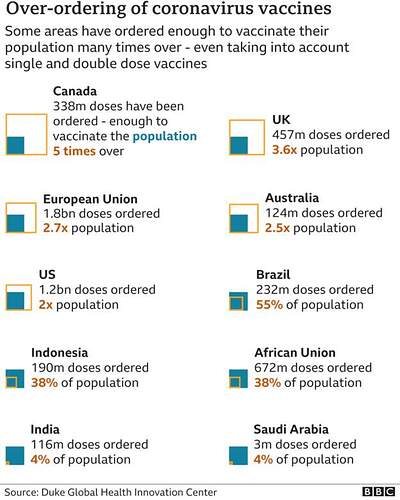That’s huge!
You brought it up as a reason for the drop. It is not one. Simply using the term at all is uninformed.
We are flying completely blind on the actual vs measured number of infections. WSJ editorial from a Johns Hopkins Professor claims 55% have been infected. Then he adds on vaccinated on top to say herd in April.
However, he does not factor that if there is a huge fraction that unknowingly already have antibodies, then a big fraction of the vaccinated will go to those folks- in essence he is double counting the vaccinated as new immunes by something approaching half.
April seems optimistic to me. He is using a multiplier of over 6 to get from measured to actual cases. Best estimates I’ve seen is more along the lines of 3x. In that case we are more like 25% natural immunity and we would have to discount the vaccinated by about 20% to factor in the offset.
If we had a competent CDC all along we’d be looking for seropositivity in big populations to better understand.
https://twitter.com/kleinfeldtstacy/status/1362761122139361280?s=21
Definitions do matter. People hear “herd” and think “it’s over”. That’s not nit picking and frankly science is all about the little details.
Herd is a solid wall. What folks are describing is a fish net designed for tuna. Big difference.
That. Is. My. Point.
“Partial herd immunity” cannot explain what is happening.
We booking that bet from yesterday? I pretty much agreed to what you wanted with some minor stipulations.
Here is a simple script for an expert in a particular domain to use when a nonexpert misuses technical terminology from the domain:
“That’s interesting, but in [describe field], we would be careful not to describe [thing] as [improperly used term]. In [field], it’s really important to draw a clear distinction between [things properly described by the term] and [similar thing inappropriately described by the term]. When we want to talk about [similar thing], we usually say [technically correct description]. To help me keep things straight, can we agree to use [technically correct term] for [similar thing]?
From the experience of the NFL, any time at all inside with an infected person when neither were wearing masks was reasonably likely to cause an infection. Hopefully you dodged the bullet, but I wouldn’t do that again.
But if you’re going to die young, might as well be for a pasty.
Higher efficacy in Oxford jab with three months between doses
A three-month gap between the two doses of the Oxford-AstraZeneca coronavirus vaccine results in higher vaccine efficacy than a six-week gap, a new study suggests.
The research indicates that with three months between the first and second dose there was an overall efficacy of 81%, compared to 55% for a six-week interval.
The first dose offered 76% protection in the three months between doses, according to the University of Oxford research published in The Lancet.
I don’t understand these numbers. The first dose initially offers 76% protection but if you get the second dose after 6 weeks you only get 55%?
It would appear most of the protection is built up in the 6-12 week period after first dose. UK has been saying for a while that the 2nd Oxford shot is merely a booster but looks like it harms overall effectiveness if second dose given too soon after first dose (3-6 weeks)
Confirmed
This might also help explain why the weird screwup with people receiving half a dose actually proved to be helpful.
Gl.
‘America is back and engaged in helping’, says Blinken
“America is back” and fully engaged in helping resolve global issues including the pandemic, US Secretary of State Anthony Blinken tells the BBC.
In his first international interview, Blinken stressed the importance of worldwide vaccination against Covid-19, marking a break with the “America First” policy of Donald Trump.
The US is giving $4bn (£2.85bn) to the Covax vaccination scheme, which aims to deliver more than two billion doses to people in 190 countries in less than a year.
“Unless and until everyone in the world is vaccinated, then no-one is really fully safe, because if the virus is out there and continuing to proliferate, it’s also going to be mutating,” Blinken said.
The US has now vaccinated more than 27 million of its own people. However, in many poorer countries, vaccination has yet to begin.
Nice to see that cases worldwide seem to be trending down. However locally it’s trending in the wrong direction. There was an outbreak at the local jail a couple weeks ago and now reports are that it’s ripping through the homeless community. We are currently at the peak for active cases, hospital admissions are spiking and I’ve heard rumours that it’s even worse than what reported so far.
My cousin and my aunt also tested positive this week. The first people in my family to have it. 
My cousin works at a hotel and likely that’s where he caught it and my aunt caught it from him cause they live together. I’m not sure what symptoms they have but hopefully they’ll be alright. I’m definitely concerned that my aunt has it because she’s in her 60’s and overweight.
Wasn’t long ago that we were doing way better than the rest of the province (lots of locals thought we shouldn’t have been in lockdown with the rest of the province) but now we are doing way way worse.
I would much prefer that churchill has very bad luck on this particular bet.
Like Wichita’s side… if it was deaths it would have been too easy imo.
